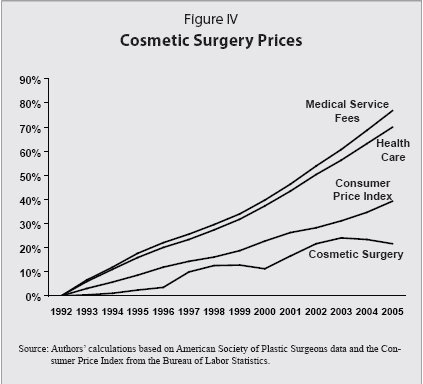Apparently, the Obama administration is worried about the shortage of GP physicians. Personally, I think anything we do within the present framework, or more onerous government interventionist approaches likely to be proposed by Obama, will fail at reversing this problem. If plumbers were not allowed to contract directly for price and scope of service with individual homeowners they serve, and were forced instead to fill out 23 yards of paperwork just to get paid rates that were set by government bureaucrats, subject to thousands of pages of regulations any one of which could cause his payment request to get rejected, we would have a shortage of plumbers too.
However, since no one in Washington currently seems to be in the mood topromote commercial relationships in medicine that mirror how we contract for every other product and service, I guess we can nibble at the edges of the problem. David Bernstein suggests:
I have yet to see in any of these articles one simple reform proposed: abolish the requirement of an undergraduate degree before attending medical school, and turn medical school into a five or six-year post-high school program instead. This would eliminate two or three years of debt, and, perhaps even more important, the opportunity costs of two or three years of college. Right now, an aspiring physician must go to college for four years (and take many classes that have nothing to do with his future career), then medical school for four years, and then typically do a poorly paid internship and then residency for another five years. By the time this aspiring physician goes into practice, he will be at least thirty-one years old, and have eight years of student loan debt.
I have a better solution. Why do we have a one-size-fits-every-corner-of-the-medical-field education and licensing at all? Why do I need to pay for someone with 8 years of college and five years of residency to put three stitches in my kids' cut? Or to write a Viagra scrip? In dentistry, why do oral hygienists all seem to be in dentists' offices? Why do I need to pay the overhead of a dentist to get my teeth cleaned?
We shouldn't really be surprised, I guess, about this licensing approach -- when the government turns over the licensing board to the incumbents of the industry being licensed, they have every incentive to choke off supply and to kill any initiative that might create low-cost competition for themselves.
So the licensing system that is all or nothing -- you are either a full-fledged medical doctor that can handle anything, or someone who is allowed to handle nothing. This is reinforced by the payment system we have, where people do not bear the marginal cost of the services they consume. So, since every office visit costs them the same (zero or a fixed copay), they might as well ask for the most experienced and over-educated guy they can find -- it's not costing them any extra.
Well, this is true for most people. I have a high-deductible health insurance policy, and we often consider the price of different alternatives. Here is an example. I am a healthy person, but still go in for a physical each year. Nothing complicated happens in these visits. Surely there could be some kind of less-trained traige MD who could conduct such screenings, passing folks on to the full-fledged doctors if anything unusual pops up. If you told me that I could be seen by such a person for $100 or a full MD for $300, I would certainly consider it, particularly since the triage guy's schedule probably runs smoother as he doesn't get bogged down with the unexpected -- he just passes those folks on.




